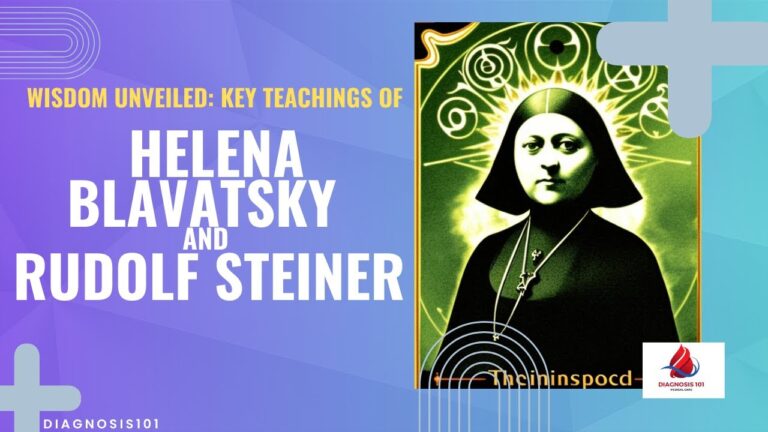Theosophy and Anthroposophy are two significant spiritual movements that emerged during the late 19th and early 20th centuries. Both were founded by visionary thinkers—Madame Helena Blavatsky and Rudolf Steiner, respectively—each with a unique perspective on esoteric knowledge and spiritual evolution.
Madame Helena Blavatsky, a Russian occultist and spiritual teacher, founded the Theosophical Society in 1875, along with Henry Steel Olcott and William Quan Judge. Theosophy sought to unite Eastern and Western spiritual traditions, aiming to uncover ancient, esoteric wisdom that was believed to be the core of all religious and philosophical teachings.
Blavatsky’s major works, “The Secret Doctrine” and “Isis Unveiled,” outlined Theosophical principles. She emphasized the existence of a universal brotherhood of humanity and explored concepts like karma, reincarnation, and the unseen spiritual hierarchies that influence human life. Blavatsky’s teachings also stressed the importance of individual spiritual development and the evolution of consciousness.
He term “Theosophy” is derived from the Greek words “theos” (God) and “sophia” (wisdom), often interpreted as “divine wisdom” or “wisdom of the gods.” Key Principles and Beliefs of Theosophy: Unity of All Religions and Philosophies: Theosophy aims to synthesize and integrate the fundamental truths found in various religious and philosophical traditions around the world.
It seeks to identify a common thread of wisdom that underlies all spiritual teachings. Reincarnation and Karma: Theosophy posits the belief in reincarnation—the cycle of successive lives in different bodies—as a mechanism for spiritual growth and evolution.
Karma, the law of cause and effect, is viewed as a fundamental principle governing one’s actions and their consequences across lifetimes. Brotherhood of Humanity: Theosophy emphasizes the idea of a universal brotherhood that transcends all boundaries of race, religion, and nationality. It encourages understanding, compassion, and unity among all people.
Hierarchy of Beings and Planes of Existence: Theosophy introduces the concept of a hierarchical order of spiritual beings and planes of existence. It suggests that there are various levels of consciousness and spiritual entities that influence the evolution of humanity and the cosmos.
Divine Wisdom and Masters: Theosophy proposes the existence of enlightened and advanced spiritual beings, often referred to as “Masters” or “Mahatmas,” who possess profound wisdom and guide humanity’s evolution from behind the scenes. Esoteric Knowledge: Theosophy delves into esoteric or hidden knowledge, aiming to explore deeper truths about existence, consciousness, and the nature of reality.
This knowledge is believed to have been passed down through generations and across civilizations. Transcendence and Spiritual Evolution: Theosophy advocates for the spiritual evolution of individuals, encouraging them to transcend their current state and strive for higher levels of consciousness, wisdom, and compassion.
Rudolf Steiner, an Austrian philosopher, scientist, and mystic, was initially associated with the Theosophical Society but later diverged to develop his own spiritual philosophy, known as Anthroposophy. Steiner’s spiritual journey began with a keen interest in philosophy, Goethean science, and spiritual experiences.
In 1913, Steiner broke away from the Theosophical Society and established the Anthroposophical Society. Anthroposophy, meaning “wisdom of the human being,” delved into the exploration of the spiritual dimensions of humanity and the cosmos. Steiner emphasized the importance of integrating spiritual insights with practical aspects of life, encompassing education, agriculture, medicine, and the arts.
He developed unique approaches to these fields, such as Waldorf education, biodynamic farming, anthroposophical medicine, and eurythmy—a form of expressive movement. The term “Anthroposophy” is derived from the Greek words “anthropos” (human) and “sophia” (wisdom), often translated as “wisdom of the human being” or “knowledge of the self.” Key Principles and Beliefs of Anthroposophy:
Spiritual Science: Anthroposophy seeks to merge spiritual insights with scientific understanding. It emphasizes a systematic and methodical approach to spiritual exploration, aiming to bring a scientific rigor to the study of spiritual phenomena and human consciousness.
Knowledge of the Spiritual World: Anthroposophy explores the spiritual dimensions of reality and seeks to understand the spiritual world and its relationship to the material world. It delves into the nature of spiritual beings, reincarnation, karma, and the evolution of human consciousness.
Threefold Nature of Humanity: Steiner proposed that human beings possess a threefold nature: the physical body, the soul or psyche, and the individual spirit or “I.” Anthroposophy explores the interactions and development of these aspects throughout an individual’s life and across lifetimes.
Holistic Approaches: Anthroposophy advocates for holistic approaches in various aspects of life, including education, medicine, agriculture, and the arts. Steiner developed specific methods and principles in these areas that align with spiritual insights.
Waldorf Education: Rudolf Steiner’s ideas greatly influenced Waldorf education, an alternative educational approach that seeks to nurture a child’s physical, emotional, intellectual, and spiritual development. Biodynamic Farming: Anthroposophy also influenced biodynamic farming, an agricultural method that integrates spiritual insights and ecological principles for sustainable farming practices.
Eurythmy: Eurythmy is a unique form of expressive movement developed within Anthroposophy. It is considered a spiritual art form and a means of embodying spiritual truths through movement. Social Renewal: Anthroposophy proposes a vision for social renewal based on principles of freedom, equality, and fraternity.
It advocates for a society where individuals are empowered to develop their full potential while respecting the needs and contributions of others. While both Theosophy and Anthroposophy aimed to explore spiritual truths and promote human evolution, they had distinct emphases.
Theosophy placed a stronger focus on synthesizing various spiritual traditions and ancient teachings, aiming for a universal understanding of spirituality. In contrast, Anthroposophy was more individual-centric and focused on practical applications of spiritual insights in everyday life. Madame Blavatsky’s works were instrumental in laying the foundations of esoteric thought, influencing numerous spiritual movements.
Rudolf Steiner, building upon this foundation, introduced practical applications and a deeper understanding of the human being’s role in the spiritual fabric of the universe. In conclusion, Madame Blavatsky and Rudolf Steiner significantly contributed to the spiritual landscape of their times, providing unique perspectives that continue to inspire seekers and spiritual practitioners to this day.
Their teachings, whether through Theosophy or Anthroposophy, reflect a profound quest for knowledge, spiritual growth, and the betterment of humanity.
source
